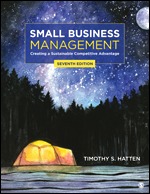Solution Manual for Small Business Management Creating a Sustainable Competitive Advantage, 7th Edition, Timothy S. Hatten,
Solution Manual for Small Business Management Creating a Sustainable Competitive Advantage, 7th Edition, Timothy S. Hatten,
$55.00
Description
Solution Manual for Small Business Management Creating a Sustainable Competitive Advantage, 7th Edition, Timothy S. Hatten,
Table Of Content
Preface
Acknowledgments
About the Author
PART I: THE CHALLENGE
Chapter 1: Small Business: An Overview
Concept Module 1.1: What Is Small Business?
Concept Module 1.2: Small Businesses in the U.S. Economy
Concept Module 1.3: Workforce Diversity and Small Business Ownership
Concept Module 1.4: Secrets of Small Business Success
Concept Module 1.5: Understanding the Risks of Small Business Ownership
Chapter Review
Chapter 2: Small Business Management and Entrepreneurship
Concept Module 2.1: The Entrepreneur–Manager Relationship
Concept Module 2.2: A Model of the Start-Up Process
Concept Module 2.3: Your Decision for Self-Employment
Concept Module 2.4: Creativity and Innovation in Small Business
Chapter Review
PART II: PLANNING IN SMALL BUSINESS
Chapter 3: Social Entrepreneurs, Ethics, and Strategic Planning
Concept Module 3.1: Relationship Between Social Responsibility, Ethics, and Strategic Planning
Concept Module 3.2: Social Entrepreneurship
Concept Module 3.3: Ethics and Business Strategy
Concept Module 3.4: Strategic Planning
Chapter Review
Chapter 4: The Business Plan
Concept Module 4.1: Every Business Needs a Plan
Concept Module 4.2: Business Models and Feasibility Analysis
Concept Module 4.3: Business Plan Contents
Concept Module 4.4: Review Process
Concept Module 4.5: The Pitch
Chapter Review
PART III: EARLY DECISIONS
Chapter 5: Franchising
Concept Module 5.1: About Franchising
Concept Module 5.2: Why Open a Franchise?
Concept Module 5.3: Selecting a Franchise
Chapter Review
Chapter 6: Taking Over an Existing Business
Concept Module 6.1: Business-Buyout Alternative
Concept Module 6.2: How Do You Find a Business for Sale?
Concept Module 6.3: What Do You Look for in a Business?
Concept Module 6.4: What Are You Buying?
Concept Module 6.5: How Much Should You Pay?
Concept Module 6.6: Buying the Business
Concept Module 6.7: Taking Over a Family Business
Chapter Review
Chapter 7: Starting a New Business
Concept Module 7.1: About Start-Ups
Concept Module 7.2: Types of New Businesses
Concept Module 7.3: Evaluating Potential Start-Ups
Concept Module 7.4: Getting Started
Chapter Review
PART IV: FINANCIAL AND LEGAL MANAGEMENT
Chapter 8: Accounting Records and Financial Statements
Concept Module 8.1: Small Business Accounting
Concept Module 8.2: Small Business Accounting Basics
Concept Module 8.3: Analyzing Financial Statements
Concept Module 8.4: Managing Cash Flow
Chapter Review
Chapter 9: Small Business Finance
Concept Module 9.1: Funding for Small Business
Concept Module 9.2: Basic Financial Vocabulary
Concept Module 9.3: How Can You Find Capital?
Chapter Review
Chapter 10: The Legal Environment
Concept Module 10.1: Small Business and the Law
Concept Module 10.2: Bankruptcy Laws
Concept Module 10.3: Contract Law for Small Businesses
Concept Module 10.4: Laws to Protect Intellectual Property
Concept Module 10.5: Forms of Business Organization
Chapter Review
PART V: MARKETING THE PRODUCT OR SERVICE
Chapter 11: Small Business Marketing: Strategy and Research
Concept Module 11.1: Small Business Marketing
Concept Module 11.2: Marketing Strategies for Small Businesses
Concept Module 11.3: Market Research
Chapter Review
Chapter 12: Small Business Marketing: Location
Concept Module 12.1: Small Business Distribution
Concept Module 12.2: Location for the Long Run
Concept Module 12.3: Site Selection
Concept Module 12.4: Location Types
Concept Module 12.5: Layout and Design
Concept Module 12.6: Lease, Buy, or Build?
Chapter Review
Chapter 13: Small Business Marketing: Price and Promotion
Concept Module 13.1: The Economics of Pricing
Concept Module 13.2: Breakeven Analysis
Concept Module 13.3: Price-Setting Techniques
Concept Module 13.4: Getting Paid
Concept Module 13.5: Promotion
Chapter Review
PART VI: MANAGING SMALL BUSINESS
Chapter 14: Professional Small Business Management
Concept Module 14.1: Managing Small Business
Concept Module 14.2: Small Business Growth
Concept Module 14.3: Leadership in Action
Concept Module 14.4: Special Management Concerns: Time and Stress Management
Chapter Review
Chapter 15: Human Resource Management
Concept Module 15.1: Hiring the Right Employees
Concept Module 15.2: Employee Recruitment
Concept Module 15.3: Selecting Employees
Concept Module 15.4: Placing and Training Employees
Concept Module 15.5: Compensating Employees
Concept Module 15.6: When Problems Arise: Employee Discipline and Termination
Chapter Review
Chapter 16: Operations Management
Concept Module 16.1: Elements of Operating Management
Concept Module 16.2: Operations Management
Concept Module 16.3: What about Scheduling Operations?
Concept Module 16.4: Quality-Centered Management
Concept Module 16.5: Purchasing for Small Business
Concept Module 16.6: Managing Inventory
Chapter Review
Glossary
Notes
Index



Reviews
There are no reviews yet.